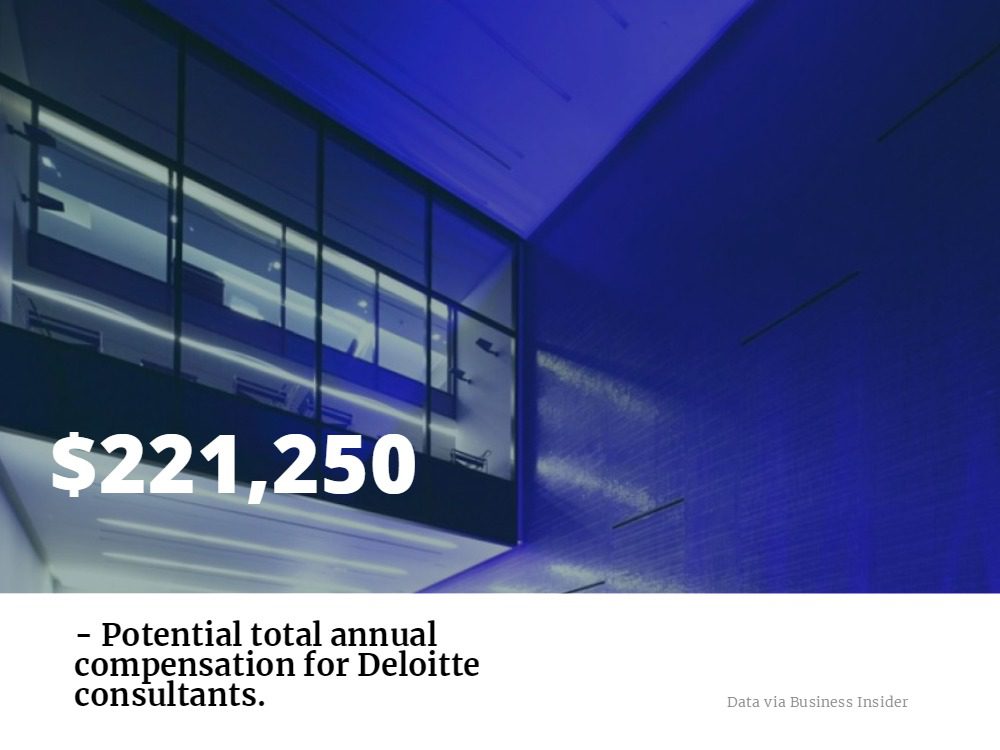How Can You Earn a Career at Deloitte?

In 2017, Deloitte placed 11th out of “Fortune’s 100 Best Companies” to work for. It achieved its top slot thanks to the company’s focus on work/life balance where “you decide how fast paced/slow paced you want to take it.” In fact, 91 percent of Deloitte employees say their workplace is great with:
- Great challenges (96 percent)
- Great atmosphere (95 percent)
- Great rewards (94 percent)
- Great pride (97 percent)
- Great communication (95 percent)
- Great bosses (94 percent)
So, it’s no wonder that Deloitte is a top career choice for many MBA students. The company fits the 33 percent of 2016 post-graduate MBAs who want to work in consulting according to the 2017 Prospective Student Survey conducted by the Graduate Management Admissions Council (GMAC). And Deloitte also falls into the Big Four—KPMG, EY, PwC, and Deloitte—a prestigious place to be.
In addition, Deloitte is a major MBA recruiter with a depth of different career opportunities including Strategy & Operations, not just consulting. According to Transparent Career—a GlassDoor for MBA students—Deloitte ranks as the seventh best consulting company to work for with a composite score of 81/100.
Why You Should Consider Deloitte
So, why should you consider Deloitte as your next career move?
- Culture: For 18 years, Deloitte has been on Fortune’s “100 Best Companies to Work For” list. That indicates consistency.
- Giving Back: Deloitte supports more than 5,000 nonprofits each year through its workplace giving program. Plus, workers gave more than 440,000 volunteer hours in 2016.
- Inclusion: Approximately 2/3 of Deloitte’s new hires were women and minorities, and DiversityInc ranks it as one of the “Top 50 Companies for Diversity” and has done so for 13 years.
Deloitte also pays very well. In fact, according to a recent Business Insider article, Deloitte is ranked as the fifth best paying consulting firm for MBAs. Deloitte Consultants can expect a total compensation package of $221,250. The break down is as follows:
- $25,000 signing bonus
- $149,000 base salary
- $2,500 relocation local or $10,000 relocation out-of-state
- Up to $37,250 in performance bonuses
As for what working at Deloitte is like, according to efinancialcareers, “People say they love working for Deloitte because of its ‘dedicated workforce, dynamic and exciting work environment [with] opportunities for professional growth and advancement,’ as well as its ‘flexibility and mobility’ and ‘interesting assignments.’”

And one current employee described Deloitte as “invested in learning and development” saying that “partners and directors are very approachable” while coworkers are “well-educated and professional.”
Life at Deloitte
What’s a day in the life of a Deloitte new hire look like? It depends on where you work. Deloitte isn’t just a consulting company. MBAs can work in a variety of industries including banking, energy, national defense, real estate, and entertainment and in a variety of functions from mergers and acquisitions to audit and assurance, tax, and financial advisory.
Your career path at Deloitte will depend on where you’re hired. If you’re thinking of a career in management consulting, then joining the Strategy & Operations program as a Business Analyst is a smart move. As an MBA, you’ll start at the senior consultant level for two to three years. From there, you’ll move to manager for three to six years, senior manager for 406 years, and then finally reach principal/director. Within this career path, you’ll help market-leading client organizations tackle their complex business programs to drive results. You’ll be exposed to a variety of industries, clients, and projects.
There are quite a few other options as well. You can join Deloitte as a:
- Senior Consulting in Technology, where you’ll make strategic decisions where technology intersects with business strategy. In this position, you’ll use technology to help companies grow and evolve.
- Human Capital Consultant, where you’ll help clients develop solutions across their enterprise looking beyond human resources.
- Audit Staff Assistant, where you’ll work with a team to navigate the difficult landscape of auditing first-hand.
Depending on your previous experience, MBAs at Deloitte can work in one of eight divisions:
- Audit
- Consulting
- Financial Advisory
- Internal Client Services
- Real Estate
- Risk
- Tax Consulting
- Technology
Landing a Deloitte Career
Landing a job at Deloitte starts with their Deloitte Consulting Immersion Program, Client Service Internship, and various competitions. In each of these programs, MBA students will have the opportunity to interact with higher-ups at Deloitte who are responsible for hiring.
During the internship, MBA students will spend eight to ten weeks working in one of four business functions: risk and financial advisory, audit and assurance, consulting, and tax. On the other hand, the Immersion Program is just three days in length but provides MBAs with the opportunity to evaluate the depth, breadth, and quality of the job opportunities at Deloitte. As for the competitions, the National Case Competition and the National Consulting Case Competition are held at Deloitte University each year—inviting top students from MBA programs around the world.
Still, landing a job at Deloitte isn’t easy. Heidi Soltis-Berner, the Managing Director for talent at Deloitte, told efinancialcareers:
“We’re always looking for the best talent, and we’re pretty selective in who we hire. Overall, our applications were very similar to last year—we got around 500,000, and in the fiscal year 2016 we hired approximately 18,000 individuals, about 50 percent to 60 percent were from a campus setting, which equates to about a 4 percent hiring rate, pretty close to what it was last year.”
Specifically, at the graduate level, Deloitte added 6,400 new hires in 2016—most of those post-internship. According to the Deloitte website, qualified MBA candidates looking to earn a Senior Consultant position should have:
- 3-5 years work experience (preferably in a large company)
- A high level of personal and professional experience and history
- Superior analytical skills
- Willingness to travel
- Leadership capabilities and solid teamwork skills
- Exceptional communication and interpersonal skills
Celebrating Diversity During One Wharton Week at UPenn

Clear Admit recently explored how the Wharton School at the University of Pennsylvania has become a premiere institution of diversity among U.S. business schools.
As part of a commitment to celebrating and examining diversity, the MBA community at the University of Pennsylvania’s Wharton School has, since 2015, observed an annual Return on Equality (ROE) Week—recently renamed One Wharton Week. Throughout the week, held this year from February 12th through 15th, MBA students gather to build community and create an open dialogue about diversity through lectures, panels, and other special events.
“One Wharton Week has evolved in the three years since Return on Equality was founded, but at its core, it’s still the greatest demonstration of how the Wharton community can come together and learn from each other,” Simone Thomas, WG’18, co-president of ROE, explained in a news story on the Wharton website. ROE is a student-led coalition with the stated vision of making Wharton “a pioneering institution that deliberately equips students to be leaders and advocates of inclusive organizational practices, enabling individuals to be recognized and valued as their whole selves.”
One Wharton Week is made possible by a coalition of clubs and student organizations from across the university that come together to put on programming. In the mix this year, the Wharton Analytics Club hosted an event examining bias in technology and algorithms. The Media & Entertainment Club also screened the movie Get Out, which addresses a range of topics related to racism, and followed up the viewing with small group discussions.
“We wanted this collaborative effort to express the deep commitment from all groups to diversity and inclusion work here at Wharton,” Thomas said.
Other events included a discussion of personal faith, a talk from Vice Dean of the MBA program Howard Kaufold entitled “The Business of Equity,” and an examination of the #MeToo movement. The #MeToo talk was one of the most highly anticipated events for the week, staged amid an intense political climate on campus and many efforts to make a difference put forth by students, organizations, and administrators.
“We’re hoping to facilitate an open discussion in which we can understand the experience and thoughts from both genders and provide a platform for people to ask questions about a very uncomfortable and complicated topic,” Thomas explained. A full schedule of the events hosted during One Wharton Week is listed here.
Although One Wharton Week is largely student run—with members of the MBA Classes of 2018 and 2019 in charge of securing speakers, promoting the week, and advising on content—it also receives strong administrative support. This partnership between the administration and students was formed in 2017 when Kaufold asked members of the Diversity & Inclusion (D&I) Steering Committee to meet with students to collaborate and advise on the MBA program’s diversity and inclusion strategy.
Below is a sneak peek inside One Wharton Week 2018.
From Just One Woman to 39 Percent of the Class—and Other Ways LBS Has Changed Over the Past 50 Years

The 2017-18 academic year marks the 50th anniversary of the MBA program at London Business School (LBS). Since 1968, the school has offered a two-year Master of Science (MSc) in Business Studies degree program—the original MBA—and has continuously refined its offerings since that time. In celebration of the 50-year mark, LBS is looking back at how far the program has come.
The Beginning
In 1966, two years after London Business School opened its doors, the school launched a two-year Master of Science (MSc) in Business Studies. The first class consisted of 35 men and just one woman, with the average age around 25 years old. The goal of the two-year degree was to prepare students for employment. In fact, according to the website, employment was seen as “one of the most significant aspects of the school’s progress at this stage of its development.”
After graduation, most students joined manufacturing firms, and a few went into merchant banking, management consultancy, and advertising. Their job functions included marketing and financial executives, planning personnel, and personal assistant roles.
As for the feedback on the first year of study, a report on the class stated, “The overall academic performance of the students during the year has been more than satisfactory. The course of studies is arduous and the number of hours of work required is much above average, imposing a considerable workload both on students and staff.”
The Early Years
In the early years of the program, growth was slow but steady. In 1971, the class size grew to 86 students and by 1975, 108 students were admitted, including 16 women. Throughout this time, LBS made various modifications to its program.
- In 1973, LBS introduced the International Management Program, which gave 10 students the change to study abroad in Paris or at New York University.
- In 1978, the International Management Program expanded to include Harvard, Stanford, Wharton, Chicago, and top European institutions.
The 1980s
The 1980s were a time of change for LBS and the MBA program. During these years, banking and finance overtook manufacturing as the top industry for graduates. In addition, LBS continued to increase its international reputation; about half of its class comprised non-British students by the end of the decade, with more 30 nationalities represented. Most importantly, the Class of 1987 was the first to be awarded an MBA rather than an MSc degree. In an annual report, the school stated, “This more accurately and effectively conveys the spirit of the program, and the type of qualifications our students are aiming for.”
- In 1982, LBS introduced a new part-time master’s program. The first class accepted 60 people and allowed students to complete their studies over two and a half to three years while still working.
- In 1984, three more U.S. schools joined the International Exchange Program including Dartmouth Tuck, MIT Sloan, and Northwestern Kellogg.
The 1990s
In the 1990s, LBS adopted a more flexible format for its MBA program. The school added increased training in “soft skills” and introduced computer-based management simulation games. The class size also increased to 271 students, with 79 percent of students coming from outside the United Kingdom. Consulting became the top choice for graduates, and manufacturing shrunk to just 11 percent.
- In 1992, LBS introduced a language requirement where students must be fluent in English and one other language to graduate. In addition, the part-time master’s was re-launched as the Executive MBA.
- By 1996, entrepreneurship became an important part of the program, and the school launched several electives with an entrepreneurial focus, including “Small Business Management” and “Financing the Entrepreneurial Business.”
- 1999 was the first Financial Times Global MBA ranking, and LBS ranked #1 in Europe and #8 in the world—the only non-U.S. school in the top 10.
The 2000s
By the 2000s, LBS had become a global leader in MBA education—and in 2009 it became the first non-U.S. school to top the Financial Times ranking. The MBA program was reformatted for increased flexibility, allowing students to graduate in 15 to 21 months. The class size also increased to 315 students, with 89 percent of the class from 59 countries outside the United Kingdom.
- In 2001, LBS ranked as the best Global MBA by the Financial Times, and Forbes ranked LBS as #1 in Europe and #2 in the world for return on investment.
- In 2003, LBS became the first European school to join the Forté Foundation to increase women in business, and in 2005, women made up 22 percent of the class.
The 2010s
In the last decade, London Business School once again revised its MBA program to give students even greater flexibility. The school also continued to increase its size, welcoming 468 students by 2018—12 times the size of the first class in 1968. In addition, women now make up 39 percent of the MBA class, and students represent 77 different nationalities.
- In 2010, LBS started its Incubator Program to help entrepreneurs. As of 2017, 58 businesses have completed the incubator, raising more than £31 million and creating 440 full-time jobs.
- In 2012, LBS launched the Global Business Exchange (GBE), giving students the opportunity to spend a week in another country with options ranging from South Africa to the United States.
- In 2016, LBS completed its first fundraising campaign, raising £125 million.
To learn more about the 50th anniversary celebration of London Business School’s MBA, visit the school website.
This article has been edited and republished with permissions from our sister site, Clear Admit.
Berkeley Haas Debuts Dialogues on Race Seminar Series

Discussing race, identity, and power among colleagues can be a tough hurdle for any group, but the new Berkeley Haas School of Business ten-week, student-led seminar entitled “Dialogues on Race” is leading students to a more welcomed environment to do so.
The Race Inclusion Initiative surveyed MBA students and found that despite the fact that the vast majority “believes that understanding racial dynamics is a key component of effective leadership, less than 50 percent say they are comfortable talking about race.”
“Dialogues on Race” co-facilitator Liz Koenig, MBA ’18, believes, “The ability to reflect on identity and power is a core competency, certainly for being a leader of any kind, or a manager of human beings. My hope is that we get to a place where this is considered core to the fabric of any MBA program.”
Koenig, co-facilitator Om Chitale, MBA ’18, and faculty sponsor Assistant Professor Drew Jacoby-Senghor, “actively recruited a broad cross-section of students,” which ultimately yielded a 60/40 racial and ethnic breakdown similar to that of the US. “We didn’t want to end up in a situation where there was anyone who felt like they had to speak for a group,” adds Koenig.
Students who participated in the seminar were prompted to share reflections about when they first began to understand their racial identity, as well as “past experiences talking about race, and hopes and concerns for the class.” Anne Kramer, MBA ’18, offers, “We were there to understand differences and then have a dialogue about them.”
As someone who identifies as both black and Pacific Islander, Erin Gums, MBA ’18, and VP of Diversity of the MBA Association, explains that she had “thought about and talked about race her entire life—but was not having those conversations with her white peers.”
“Issues of race and racism are so complex and messy—there’s no one approach or one good way to solve it. If it were that simple we would have figured it out by now. There are many roles we need people to play to address systemic issues,” Gums said.
She adds, “I have chosen to be in the business world and be a business leader, and I have chosen to play a role in pushing for a less racist society. My fluency with these topics is going to be greater than that of people who have just started thinking about these issues for the first time in their lives, and that’s okay.”
Adrian Williams, MBA ’18, remarked on the evolution of the seminar’s goals over the ten-week span. “At first it was giving people practical, tactical tools on how to attack issues of diversity and inclusion outside of the classroom. Over time, we realized some of the issues were a lot more nuanced than we thought. It also became apparent that I had some blind spots that required me to think through some of my arguments.”
Of the seminar’s overarching goals, Chitale concludes, “Businesses have power and influence in society. If we can get business leaders to be open and vulnerable on ideas of identity and power and privilege, I truly believe that’s going to have an impact on society.”
Verizon is on the Lookout for MBA Students and Grads

Telecom giant Verizon Communications provides wireless and wired telephone, internet and television service, in addition to cloud-based services to businesses. One of the largest wireless service providers in the United States, and among the largest communications technology companies in the world, Verizon employs nearly 200,000 employees—including a large number of MBAs.
Working at Verizon
Working at Verizon has its perks. In addition to competitive salaries and performance-based incentives, benefits include 401(k) savings with company match and discounts on Verizon products. Some Verizon offices also feature in-house gyms, or discounted gym memberships. The company is also committed to lifelong learning, providing training, development, and tuition assistance
Other worthy benefits Verizon employees can take advantage of include:
- Adoption expense assistance
- A matching gifts program
- Military discounts
- Employee Relief Fund for victims of natural disasters
- Best-in-class health and insurance benefits
- Healthy Pregnancy Program for expectant mothers
Verizon was also recently recognized as the top company for diversity leadership by Diversity MBA Magazine.
“Being good at diversity and inclusion is not an option at Verizon. With more than 180,000 employees serving customers in more than 2,700 cities spanning more than 150 countries, Verizon is privileged to serve a very vibrant and diverse marketplace,” said Magda Yrizarry, Verizon Chief Talent and Diversity Officer.
“Being successful with a customer base like this is not possible without a diversity of people, ideas, and experiences,” Yrizarry added.
According to Diversity MBA Magazine, Verizon recruiters maintain close relationships with organizations like the Society of Women Engineers, the National Society of Black Engineers, and Hispanic Business Students and Professionals. The company also has a fantastic track record of hiring women and minorities, with women and people of color making up about 60 percent of the company’s board of directors, while women specifically make up 37 percent of senior management.
Verizon was also one of the first major companies to offer benefits to same-sex couples in domestic partnerships and provide free preventative care services to women, such as on-site mammography screenings. The company is also well-known for its practice of recruiting veterans.
“Verizon is a diverse company in its people, ideas, services, and the communities it serves,” Yrizarry said. “Our workplace culture ensures that everyone, no matter their ethnicity or background, has opportunities to contribute to the solutions required to stay relevant and competitive in the marketplace, grow professionally and advance their career.”
Joining the Verizon Team
Verizon offers a number of internships and MBA Leadership Developmental Programs to graduate business students. According to MBA Exchange, these programs offer MBAs a first-hand rotational learning experience focused in different aspects of the company. With so many different paths and career opportunities at the company, these programs are an opportunity to build strong leadership skills in a particular division of Verizon.
MBA opportunities include:
- Marketing MBA Internship
- MBA Business Transformation Internship
- MBA Finance Leadership Developmental Program
- MBA Marketing Leadership Developmental Program
- MBA Product Management and Strategy Internship
- Supply Chain MBA Internship
What Are These Jobs Like?
Let’s take a look at some of these Leadership Developmental Programs. The Supply Chain MBA Leadership Development Program is a two-year rotational program designed to develop future Supply Chain leaders at Verizon. MBAs work on projects that develop skills in supply chain, operations, strategic planning, and sustainability. Students in the Supply Chain MBA Leadership Development Program may be assigned to any of the following focus areas:
- Supplier Management
- Strategic Supply Chain Planning
- Inventory Management and Logistics
Meanwhile, the Marketing MBA Leadership Development Program challenges business students with high-impact projects that develop their skills in branding, product management, and marketing strategy. The two year rotational program is designed to develop skills in:
- Business or consumer product management
- Marketing strategy
- Marketing operations
- Branding
- Promotions
Who is Verizon Looking For in New Hires?
Verizon specifically states the type of candidates they are looking for in various job descriptions on the web. These jobs call for “a motivated self-starter” who is “never satisfied with the status quo.” The telecom giant seeks candidates who are always trying to beat a personal best and thrive in fast-paced environments where new challenges come up every day. Prospective hires should be flexible, dependable, and work well in varying environments.
It’s also a plus if any MBA internship candidate has:
- Proven record of academic, professional and leadership achievement
- Excellent organizational, analytical and critical thinking skills
- Strong quantitative and technical skills
- Great verbal, written, communication and presentation skills
- Proficiency with Microsoft Office Suite
You can find more Verizon job opportunities here.
PcW Brings Diversity Training Course to USC

Earlier this month, PricewaterhouseCoopers (PwC) conducted a diversity training course at the University of Southern California. According to a press release, the program was part of PwC’s recruiting efforts at the Marshall School of Business and Leventhal School of Accounting. Continue reading…
